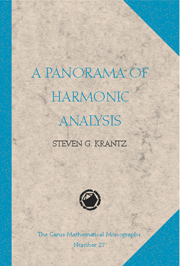Book contents
- Frontmatter
- Dedication
- Contents
- Preface
- 0 Overview of Measure Theory and Functional Analysis
- 1 Fourier Series Basics
- 2 The Fourier Transform
- 3 Multiple Fourier Series
- 4 Spherical Harmonics
- 5 Fractional Integrals, Singular Integrals, and Hardy Spaces
- 6 Modern Theories of Integral Operators
- 7 Wavelets
- 8 A Retrospective
- Appendices and Ancillary Material
- Table of Notation
- Bibliography
- Index
8 - A Retrospective
- Frontmatter
- Dedication
- Contents
- Preface
- 0 Overview of Measure Theory and Functional Analysis
- 1 Fourier Series Basics
- 2 The Fourier Transform
- 3 Multiple Fourier Series
- 4 Spherical Harmonics
- 5 Fractional Integrals, Singular Integrals, and Hardy Spaces
- 6 Modern Theories of Integral Operators
- 7 Wavelets
- 8 A Retrospective
- Appendices and Ancillary Material
- Table of Notation
- Bibliography
- Index
Summary
Fourier Analysis: An Historical Overview
We have seen that the basic questions of Fourier analysis grew out of eighteenth-century studies of the wave equation.
Decades later, J. Fourier found an algorithm for expanding an “arbitrary” function on [0, 2π) in terms of sines and cosines. Where Fourier was motivated by physical problems and was perhaps not as mathematically rigorous as we would like, P. G. L. Dirichlet began the process of putting the theory of Fourier series on a rigorous footing.
Fourier analysis has served as a pump for much of modern analysis. G. Cantor's investigations of set theory were motivated in part by questions of sets of uniqueness for Fourier series. H. Lebesgue's measure theory and the twentieth-century development of functional analysis have grown out of questions of Fourier analysis. Fourier analysis—particularly the Fourier transform—and partial differential equations have grown up hand in hand.
In the 1920s, Marcel Riesz proved that the Hilbert transform is bounded on Lp,(T), 1 < p < ∞. In one fell swoop, he established norm convergence for Fourier series, invented the subject of interpolation theory, and firmly planted singular integral operators at the center of harmonic analysis.
The theory of singular integrals took the Hilbert transform and put it in the context of a general theory of operators. A. P. Calderón, A. Zygmund, E. M. Stein, and others have shown how singular integral theory is the natural venue for studying problems of partial differential equations and of harmonic analysis.
- Type
- Chapter
- Information
- A Panaroma of Harmonic Analysis , pp. 313 - 314Publisher: Mathematical Association of AmericaPrint publication year: 1999
- 84
- Cited by



